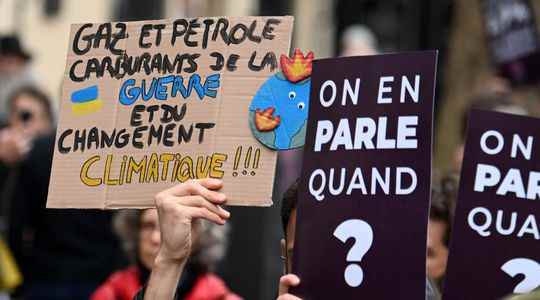Will France tear itself apart over the ecological question, like the United States? This is the risk pointed out by the study by the Descartes Foundation, which questioned a panel of 2,000 French people on their relationship to the climate and to information relating to this subject. A consensus certainly exists today on the question. Only 2% of respondents say they do not believe at all in the existence of climate change, and 90.1% consider that it will “at least probably” have serious consequences for humans and nature. As for concrete actions, 81.4% claim to limit the heating of their home, 76% say they avoid, at least from time to time, buying products from distant countries, and 73.5% claim to give up taking their car. when possible.
But for many French people, the general media deal with these issues in a way that is “too politicized, militant” (61.7%), “too anxiety-provoking” (51%). However, these grievances come rather from the right and the extreme right. Hence the fear of seeing France follow the path of the United States, “where the climate is a subject of radical political division, fears Laurent Cordonier, doctor of social sciences and author of the study. climate change is a way of displaying one’s belonging to Donald Trump’s camp. To allow such a divide to settle in our country would be catastrophic. The media must be careful not to lose the audience of a part of the population, which judges the treatment too ideological subject.”
The French especially expect the media to highlight solutions to climate change. They are 72.2% to blame them for adopting too little constructive approach. The sign of dismay? “People need hope, they want to see the light at the end of the tunnel, deciphers the academic. They are afraid of climate change and are in demand for action. They believe that the government is not at all enough active on the issue”. Aware of this request, media such as Radio France are now positioning themselves in the niche of “journalism of solutions”.
The dangers of social media
Finally, the study reveals the “counterproductive” nature of social networks for learning about the climate. “It’s a big surprise, notes Laurent Cordonier. On social networks, we find the best and the worst. We can follow the climatologist Valérie Masson-Delmotte of the IPCC, on Twitter, but we are also exposed to misinformation, to approximations…”. As shown by the responses of participants to the quiz developed by the Descartes Foundation, the general media deliver better quality information. Beware, therefore, of the magnifying glass effect on young people who are very sensitive to climate issues. Laurent Cordonier summarizes: “Being young is not in itself associated with knowing the subject better or acting more in favor of the climate. There is probably a part of the youth, less highlighted by the media, little informed and engaged on the issue.”
Knowledge of the climate does not only depend on the sources of information. The score establishes that men, retirees, older, more educated and higher-income participants score higher on average on the quiz. Why men? Perhaps because they are more interested in the natural sciences and engineering, areas where some of the climate information falls, the study suggests.
ridge line
The challenge identified by the Descartes Foundation: to make the French accept restrictive measures. While 78% of respondents are in favor of banning short-distance flights, only 26.9% approve, for example, of a carbon tax on fuels. From this perspective, fear is a good advisor… Provided that it does not turn into fatalism. “Another notable driver of individual climate action that emerges from our research is the fear of climate change and its consequences. On the other hand, if this fear turns into defeatism, the willingness to adopt virtuous environmental behaviors then decreases. “, notes the study. 15.6% of the members of the panel think that, concerning the climate, “there is nothing to be done, we will no longer be able to limit climate change”. However, displaying such defeatism is statistically associated with a lesser disposition to individual actions in favor of the planet, affirms the Foundation. A real crest line…
But the lines move very quickly. Thought unimaginable a few decades ago, 48.5% of participants believe today that “we should give priority to the climate even if it can slow down economic growth in France and cause job losses”. It remains to be seen whether these generous intentions will stand the test of the facts…
